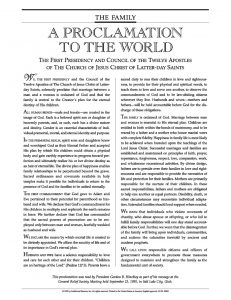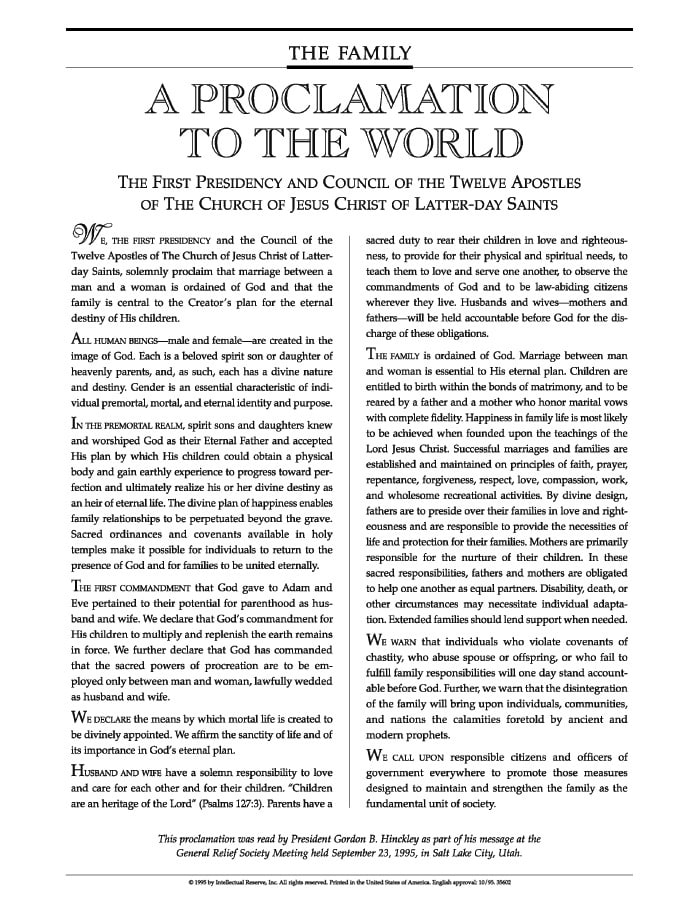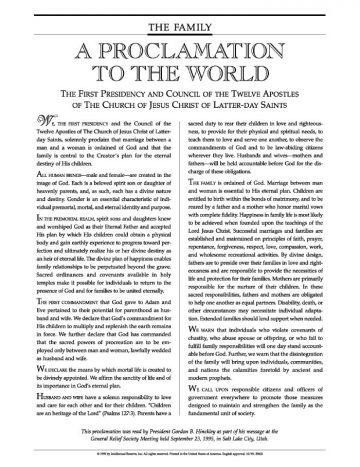The title of my post comes from a line in The Family: A Proclamation to the World. The full sentence reads, “Parents have a sacred duty to rear their children in love and righteousness, to provide for their physical and spiritual needs, and to teach them to love and serve one another, observe the commandments of God, and be law-abiding citizens wherever they live.”

I think about today’s world and the struggles that parents have in raising children. Though I am not a parent, I am a school teacher and I worry myself about how to reinforce happiness and good behavior in kids.
In today’s world, I think particularly about teaching children “to love and serve one another”.
We live in a society today where women are still seen as objects; where refugees are compared to candy; in a society where law enforcement can murder you for simply having the wrong skin color. Though–– hopefully–– not explicitly taught to children by their caregivers, it is still being taught, simply by virtue of being in this world and being surrounded by such messages.
When talking to another educator, she mentioned how one of her students called someone a lesbian. When she told me the child used the word as an insult, I thought, “Where did she learn and even get the idea that being a lesbian is a bad thing?”
That’s not love or righteousness. That’s not loving or serving one another.
I think about Mormons who still reinforce to their children that women are sexual objects who should be covered up, lest they tempt priesthood holders.
I think about fellow members and leaders who still teach that being gay is unnatural and just a temptation to be overcome.
But how do we teach something different? Even if you don’t have children, many of us still wield direct influence over a child in our lives. Whether a niece or nephew, cousin, sibling, or the children of friends, we all have ample opportunity to teach children and influence their behavior.
How do you teach the children in your life that being black isn’t a crime? Because it needs to be taught. The innocence of your child is not more important that the lives of black children who weren’t afforded that same innocence.
How do you teach the children in your life that being gay or trans doesn’t make them any less worthy of love or human rights?
How do we truly raise our children in love and righteousness? How do we truly teach them to love and serve one another, and not just give lip service to the idea?
How will teach our children to change our society instead of just being complacent in it?
I think about the children of my white friends and wonder what–– or even, if–– they are being taught about racism and oppression, about sexism and inequality. We can’t expect them to do good in this world if they don’t know what needs to be changed.
Of course, childhood should have innocence and be carefree. Heavy worries shouldn’t bear on them. But when their innocence comes at the expense of the pain of others, well, that’s when our work begins.






12 Responses
Wow. This is powerful, thank you. I have three sons, and I want them to be this. In your opinion, is it better to teach children about race issues, or to just make race a non-issue, something we don’t worry about because we love all? I can see value in both, so we are kind of in the middle.
Melissa–many studies have found that it is not possible to just make race a non-issue and expect kids to figure out things on their own. You must explicitly teach equality and love and kindness . We all must.
Thank you! This is what I was searching for.
I want to clarify, though, I wasnt exactly asking if we should just let our kids figure it out. We have had a diversity of neighbors, and we have had playdates with them all. We share meals, and chat over the fence. What I meant when I asked that question is, is it enough to teach our children by example that we expect everyone to be treated with dignity and goodness. I guess that was a silly sort of question, but I have wondered about it a lot. My oldest is five, so we do have discussion, but I’m looking for ways to further this I guess.
I’ve been thinking about this post a lot. Mostly how bothered I have been that I hadn’t been having conversations with my kids on as many topics, such race, as I felt I should be. I was talking to my husband about it, frankly, I was humiliated/horrified considering how strongly I do feel about the matter of race issues that it wasn’t happening. How could I have missed that? I’m not one to shy away from difficult conversations. My husband proceeded to name off times when he had heard me talking to our children about race — several books we’ve checked out from the library, conversations sparked by NPR coverage, etc. Apparently I have been having more conversations with my kids about this than I have been aware of, which makes me feel better to an extent. I’ll be more aware in the future now, though.
“I think about the children of my white friends and wonder what–– or even, if–– they are being taught about racism and oppression, about sexism and inequality.”
You seem to want to make this a “white” issue. Do you ever wonder what the children of your black friends are being taught? I believe far more children in black families are being taught about white oppression than children in white families are. Of course, the angle is different, but the result is still the same – race differences and tension.
If I even imply to my children that black people are different in a negative way then this is carried on.
If a black father even implies to his children that white people are different in a negative way then this too is carried on.
How we solve this, especially with what is taking place in the world, I have no idea.
I think it’s important to teach kids both the reality of the situation, as well as the ideal of the situation. The reality of the situation right now is that black people ARE treated differently and negatively in our society. The reality is that systemic oppression DOES still exist. Now obviously we don’t want that to be the case, so we need to teach our kids to raise their voices – if they hear a racial slur, speak up and say it’s not ok. If they hear somebody saying things like “you throw like a girl,” (this example is on my mind because it happened yesterday with my kids at the bus stop), they need to learn to raise their voices and say “girls can throw well, too, and you shouldn’t say that doing something ‘like a girl’ automatically means it’s being done poorly.” So I think it’s important that kids become aware of their privilege early and often, and learn to use whatever voice they have to make the world a better and more just place.
Yes black people are treated differently – especially it would appear in the US. I live in the UK and there are racial tensions. However, those racial tensions have shifted from blacks to those of middle-eastern ethnicity, and in part East Europeans.
Of course, for the very large most part, our UK police don’s shoot anyone. And those they shoot generally bring it on themselves – colour doesn’t really come into it.
Whilst I do agree that we should speak up, especially to our children, I am slightly worried that throw away comments should not always be seen as bad.
A young boy saying to another that he throws like a girl I can see could be damaging – more to the actual boy than girls in general however.
But a fully grown man, to another fully grown man, during a game of baseball for instance. Not so much. His feelings can’t be hurt. In the context “girl” is a small female child, not a fully grown female adult. It is an insult – but it is one made in the context of sport as a supposed encouragement to do better. Whether is works or not is another matter – but it’s not really sexist, IMO.
Does saying, “you cry like a baby” do any harm to babies? Or “sing like a cat”? Where do we draw the line? Well for me the line is entirely contextual.
You are as likely to hear a young girl tell another they “smell like a boy” as you are a young boy say to another they “run like a girl”. Neither is very nice, but I do question that it imprints any long lasting damage to girls or boys and their hygiene and abilities. I could, of course, be wrong.
Andrew, this kind of language is harmful to girls. I’m sorry to say it like this, but you wouldnt know because you haven’t had yo deal with trying to prove yourself beyond the stereotype that doing something like a girl is the lesser way. I grew up feeling that if I wanted to be good at anything, I needed to prove that I could do those things as well as my male peers. That isn’t right. In my childhood that translated into me despising anything feminine, because I wanted to be good at sports, I wanted to be seen as strong and capable. And being seen as feminine was not being seen as legitimately good at things in the ways boys were. I don’t understand how that isn’t harmful. I relished the looks of surprise I would garner that I could carry the same amount of weight, or play soccer so well, or shoot targets better than the boys who surrounded me (I grew up in a farming community, so these are my example, but don’t think for a moment that this experience happens only in farming communities). It is harmful for girls to hear that doing something like a girl is the wrong way. It isn’t a joke — people actually mean it when they say that. It is harmful for boys to hear that doing something like a girl is a bad thing — what does that do to their perception of the opposite sex? I honestly don’t understand how it could be considered not wrong.
I really appreciate this perspective, ERL! I hope you post more about this, because it’s something that weighs on my mind every day. You’re right; if we shield our children about race-related issues, we do so at the expense of other people’s children. The only way I feel like the deep-seated internal values of equality and love really sink in for my child is to talk about them every day, and make them a teeny bit shocking (not harsh, like you say, but shocking enough to garner a reaction and a feeling that he’ll remember as he ages.) Thomas Jefferson had slaves? (look of shock!) Phillis Wheatley was stolen from her family in Africa when she was little like me? (look of shock!) There are still people who are slaves today? (look of shock!) The follow-up conversations about “what we can do” are so, so important.
Hearing my 5yo son say, “Mama, it will not be good if Donald Trump is our president, because he will not want any brown people to come here. And if no brown people come here, our country will be so boring!” makes me think it might be sinking in.
But I need all the suggestions I can get — so please keep sharing your wisdom!
Thanks for this comment, Violadiva.
Thank you for raising such a wonderful son.